| Bonn,Germany
| 1-3 February, 2023
| https://project.gotriple.eu/events/triple-international-conference-2023/
Horizon Europe info day – Cluster 1
| Online
| 19 January 2023
| https://bit.ly/3YtYicw
Horizon Europe info day – Cluster 2
| Online
| 17 January 2023
| https://bit.ly/3j9a63J
MicrobiotaMi2022 (3rd Edition)
| Milano, Italy
| 03-05 April 2023
| https://microbiotami.com/
28th Croatian Meeting of Chemists and Chemical Engineers (28HSKIKI)
| Rovinj, Croatia
| 28-31 March 2023
| https://28hskiki.org/
EuChemS Women’s Breakfast
| Online
| 14 February 2023
| https://www.euchems.eu/gwb-women-scientists-conflicts/
Calls for funding and awards
EuChemS Awards
- EuChemS Gold Medal
Deadline: 19 December 2022 - EuChemS Lecture Award
Deadline: 19 December 2022 - EuChemS Awards for Service
Deadline: 19 December 2022 - EuChemS Historical Landmarks Award
Deadline: 19 December 2022 - EuChemS Division of Organic Chemistry Award for Research
Deadline: 31 December 2022 - EuChemS Division of Organic Chemistry Award for Service
Deadline: 31 December 2022
Marie Skłodowska-Curie Actions
- Staff Exchanges
Deadline: 8 March 2023
ERC Call
The following European Research Council (ERC) call for funding are open:
- ERC Consolidator Grants
Deadline: 2 February 2023
European Federation for Medicinal Chemistry
- EFMC Prizes 2023
Deadline: 31 January 2023
Horizon Europe Calls
- Efficient and circular artificial photosynthesis
Deadline: 10 January 2023 - Development of algal and renewable fuels of non-biological origin
Deadline: 10 January 2023 - Advanced (nano and bio-based) materials for sustainable agriculture (RIA)
Deadline: 07 March 2023 - Integrated approach for impact assessment of safe and sustainable chemicals and materials (RIA)
Deadline: 20 April 2020 - Computational models for the development of safe and sustainable by design chemicals and materials (RIA)
Deadline: 20 April 2020 - Expert network on Critical raw materials (CSA)
Deadline: 20 April 2020
European Food Safety Authority (EFSA) public consultations
A number of consultations put forward by the European Food Safety Authority (EFSA) are currently open
- Assessments following the clock stop on endocrine disruption properties for the active substance formetanate in the context of the pesticides peer review
Deadline: 16 January 2023 - Assessment Report on the active substance Proquinazid
Deadline: 3 February 2023
You can take a look at it all here.
EuChemS is an official accredited stakeholder of the European Food Safety Authority (EFSA).
European Chemicals Agency (ECHA) public consultations
A number of consultations put forward by the European Chemicals Agency (ECHA) are currently open.
- Applications for authorisation – current consultations
Deadline: 11 January 2023 - Harmonised classification and labelling consultations
Deadline: 03 February 2023
In addition, a range of Restriction proposals, Testing proposals and Harmonised classification and labelling consultations are also available – we invite you to take a look at them here.
EuChemS is an official accredited stakeholder of the European Chemicals Agency (ECHA).
European Commission Public Consultations and Roadmaps
A number of consultations and roadmaps put forward by the European Commission are currently open:
- Fight against antimicrobial resistance – ban on certain antimicrobials in animals / animal products imported into the EU
Draft Act
Deadline: 3 January - Revision of EU rules on food contact materials
Public Consultation
Deadline: 11 January 2023 - Horizon Europe – interim evaluation
Public Consultation
Deadline: 23 February 2023
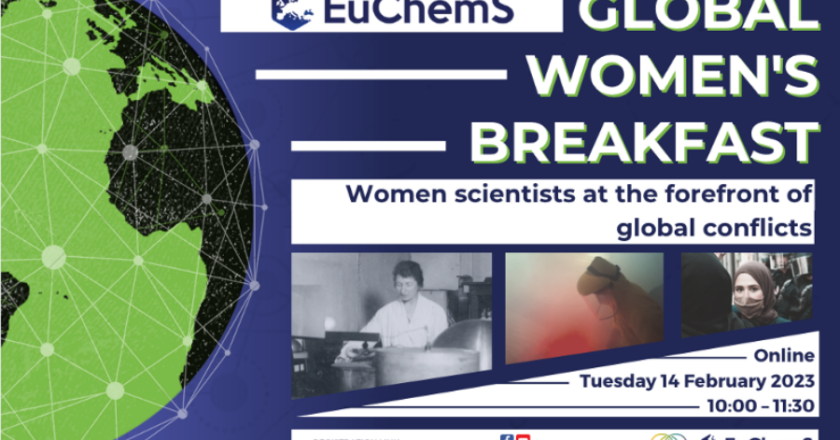
Women scientists at the forefront of global conflicts
In 2023 EuChemS will once again participate in International Union of Pure and Applied Chemistry’s Global Womens’ Breakfast (IUPAC GWB 2023) with an exciting topic, that investigates the intersection of conflict studies, inclusivity and women in science as well as chemistry.
The event, titled “Women scientists at the forefront of global conflicts” will be held online on 14 February 2023. It will look at the role of science in conflict through the eyes of women scientists, and science historians. Speakers will describe science’s role in minimising harm in conflicts and describe the often overlooked women scientists’ role in conflicts in context of history of chemistry. EuChemS finds the role of science and conflict relevant for the GWB event as just as women are often overlooked in the scientific field, conflicts scenarios tend to increase exposure to abuse and discrimination, therefore women represent one of the highly vulnerable groups in conflict.
We are happy to invite everyone to participate in this webinar, after registering here. As the key theme of GWB is inclusivity, and in addition, our event will investigate an overlap between a wide range of areas, we would be glad to see attendees from a similarly wide variety of backdrops – so we are happy to encourage everyone from every demographic background and professional field to join.
This event will mark EuChemS’ 3rd participation the IUPAC GWB for. In 2022, our international speakers examined the issue of the “leaky pipeline” amongst women in STEM, and in 2021, EuChemS focused on Leadership Development and women leaders amongst other topics.
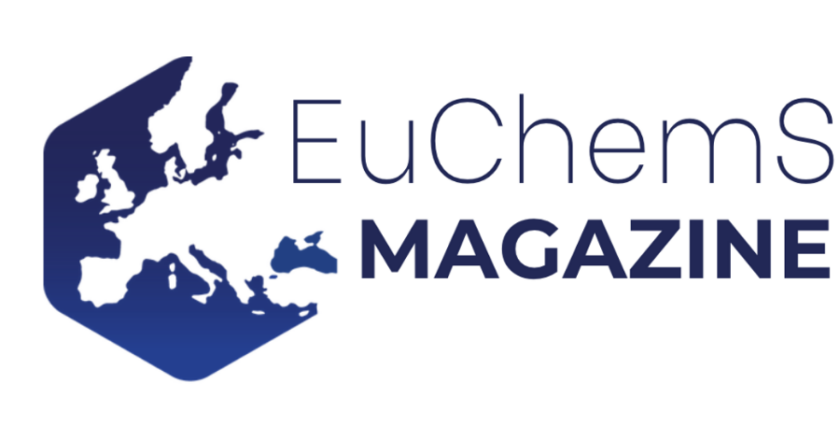
EuChemS Magazine to Launch in 2023 – Final BNU issue
EuChemS President Floris Rutjes announced the new EuChemS Publication – which will replace current EuChemS newsletters Brussels News Updates (BNU) and Chemistry in Europe (CiE) – in the editorial of the most recent CiE. This means that you are reading the last issue of Brussels News Updates – however, there are new and exciting things to come.
The new publication, EuChemS Magazine, will launch in January 2023. It will combine the contents of BNU and CiE in a more streamlined and modern format. The regular policy news bulletin written in-house will keep readers up to date with the latest developments just like BNU does while EuChemS Magazine Plus, releasing every three months, will provide in-depth research information and policy analyses, as well as interviews, and European chemistry collaboration updates, akin to what the CiE newsletter does now.
If you are subscribed to either of our newsletters, you don’t have to worry. Your existing subscription is automatically transferred to EuChemS Magazine, and you will continue to receive monthly updates. If you are not yet subscribed, we are happy to invite you to join our community.
We are looking forward to welcome you amongst the readers of EuChemS Magazine soon! Stay tuned for updates!
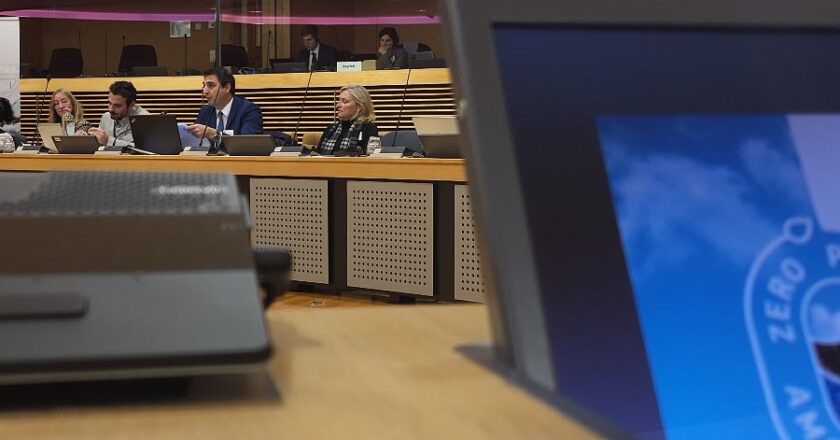
EuChemS contributes to Zero Pollution Stakeholder Conference
The Zero Pollution Stakeholder Conference was held in Brussels at the European Commission’s Berlyamont Building on 14 December. Representatives of the European Chemical Society, Executive Board member Ioannis Katsogiannis and Secretary General Nineta Hrastelj were invited to the conference, as EuChemS is a member of the Zero Pollution Stakeholder Platfrom.
The main topic of the conference was the 2022 Zero Pollution Monitoring and Outlook report, which consists of the results and future trajectories of the targets outlined in the EU’s Zero Pollution Ambition. The report uses an integrated approach to monitor a wide range of pollution metrics and their effects on health, economy and biodiversity. After demonstrating the report results, stakeholders could comment on them, leading to a lively discussion. Amongst other key themes, the role of scientific policy on a global level was further emphasized, and the creation of an UN Science Policy panel (which was called for by EuChemS at the Burlington Consensus, and discussed at the ECC8) was highlighted.
The second part of the conference consisted of three different “deep dive” sessions, each of which dealt with a specific subject related to pollution. The EuChemS delegation participated in the session on Zero Pollution and health. Executive Board member Ioannis Katsogiannis contributed to this session. After introducing EuChems to fellow stakeholders, he highlighted three key areas from a chemical standpoint. Firstly, he emphasized the high rate of European groundwater and surface water bodies which failed to achieve good chemical status. Secondly, he highlighted how waste reduction may cause other pollution-related issues due to waste burning, and lastly, he pointed out how the energy crisis may lead people to rely on hazardous heating materials, which is an issue that should be considered from a zero pollution standpoint. His contributions follows his intervention that he made on the previous Zero Pollution Stakeholder Meeting in October.
By being an active member of the Stakeholder Platform, EuChemS continues to work to ensure the sustainability of the chemical cciences, and to promote Scientific Policymaking, participating in future meetings that will follow in 2023.
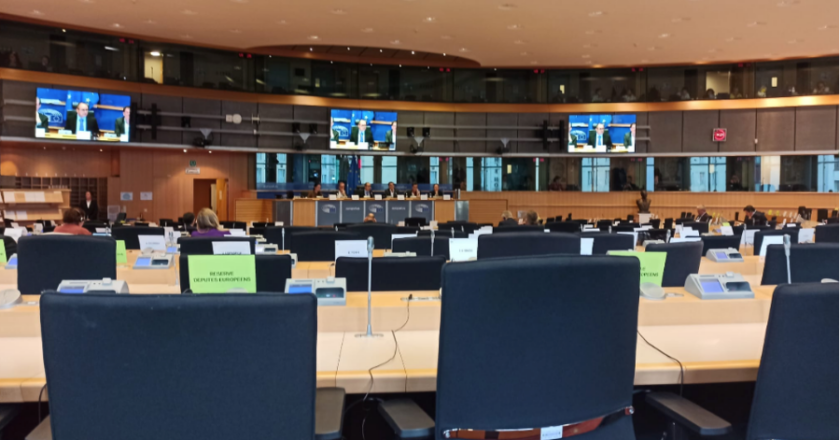
ENVI and ITRE cooperates on various topics
The Committee on the Environment, Public Health and Food Safety (ENVI) and the Committee on Industry, Research and Energy (ITRE) held joint meetings between 29 November and 1 December. The main topics were the regulation on binding annual greenhouse gas emission reductions from 2021 to 2030 contributing to climate actions following the Paris Agreement, an exchange of views with the citizens’ spokesperson for environment and climate matters in the Conference on the Future of Europe, the presentation of the Circular Economy Package, and lastly, the Convention on Biological Diversity (COP15) – which a delegation of ENVI members headed by César Luena will visit between 14-17 December.
The key theme of the 29 November ENVI-ITRE meeting was methane emission reduction. Members of both committees discussed the proposal to reduce methane emissions in the oil, gas and coal sectors.
The co-rapporteurs, Silvia Sardone (ENVI) and Jutta Paulus (ITRE) presented the main elements in their draft report on the legislative proposal that follows the EU Strategy to reduce methane. Their comments included the introduction of high standards of monitoring, reporting and verification of methane emissions, while keeping Europe’s competitiveness in the energy sector in consideration and safeguarding industry interests.
The following meetings on this topic will be held next year, on 1 March 2023 (Brussels).
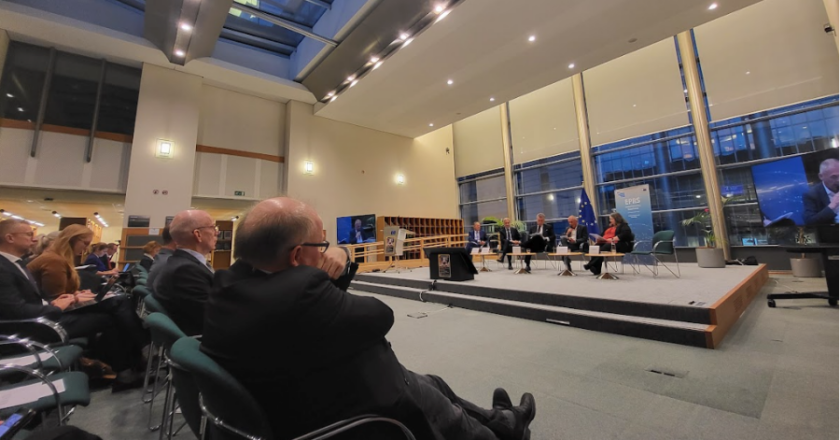
European Parliament forum for Academic Freedom launched
On 28 November, the Panel for the Future of Science and Technology (STOA) held the event “How to provide enforceable protection for academic freedom at EU level?” at the European Parliament in Brussels.
President of the European Parliament Roberta Mestola, STOA Chair Christian Ehler and Minister of Education, Culture and Science of the Netherlands Robbert Dijkgraaf were present amongst other high-profile speakers at the event, the key theme of which was academic freedom, as well as its role and importance for the European Union. The initial sessions were panel discussions, attended by a wide range of representatives from academic and academia-related backgrounds. Participating panellists aimed to establish a robust definition for academic freedom from a theoretical, academic and legal standpoint, which could help in positioning it in a European framework.
Following the panels, a European Parliament Forum for Academic Freedom (#EP4AcademicFreedom) was announced. The forum is a STOA initiative, aiming to monitor and report on the state of play of EU Academic Freedom. Members of the forum plan to deliver a yearly monitoring report. The foundations and framework of such monitoring was established at the event.
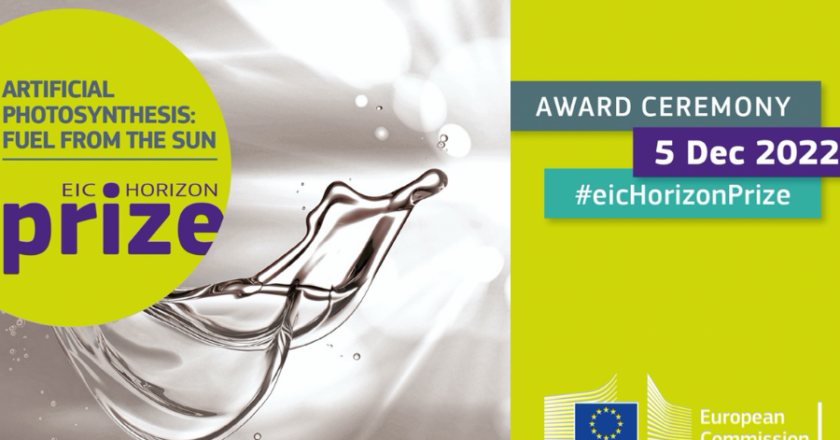
5 Million EUR Prize for Artificial Photosynthesis received
The European Commission revealed that the recipient of the European Innovation Council (EIC) Horizon Prize for Artificial Photosynthesis is the University of Tokyo in cooperation with the Japanese INPEX Corporation.
EuChemS has worked on topics related to Artificial Photosynthesis: in 2016, it released a white paper on Solar Driven Chemistry, in which it examined the opportunities solar energy can provide to drive chemical reactions. The recognition of Artificial Photosynthesis by EIC is an important milestone of solar driven chemistry, which EuChemS described as a “visionary concept” with great potential.
The goal of the competition was the development of a fuel production system that relies on combining sunlight, water and carbon. The winning project produced renewable methane gas powering an engine during the 72 hour demonstration held in Ispara, Italy, during the summer of this year. Artificial photosynthesis, using which this project functions, is an emerging technology which holds a potential to reduce relying on fossil fuel usage. It is on the radar of the EIC since 2017, the year when it opened the contest up.
The Award Ceremony was held on 5 December. From the 22 nominees, three finalists were selected: the Commissariat à l’énergie atomique et aux énergies alternatives (CEA), France, the University of Cambridge, United Kingdom, alongside the winning Tokyo University. The European Union contributes to an international initiative named Mission Innovation Challenge ‘Converting Sunlight to fuels and chemicals’ by offering this prize, which is, amongst other similar prizes, calls for innovative solutions for major contemporary challenges.
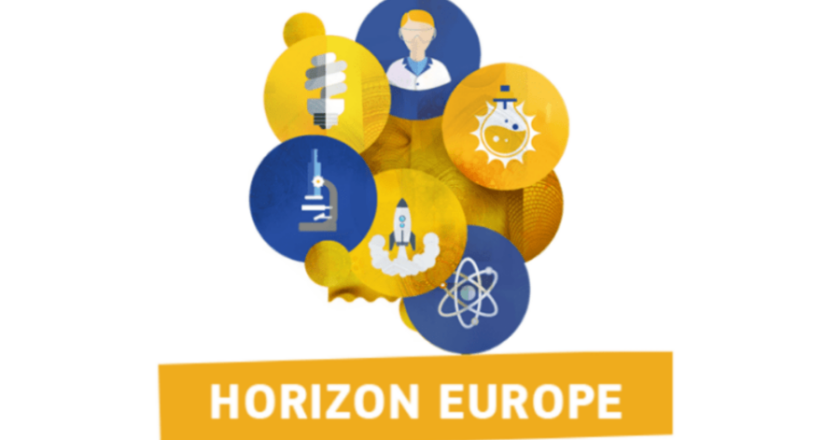
Horizon Europe Budget confirmed as programme aims to expand
The 2023-2024 work programme for Horizon Europe was adopted by the European Commission on 6 December. This means that Horizon Europe will be equipped with approximately 13.5 billion EUR that will be directed towards the support of researchers working on projects related to the European Union’s key science-policy areas, including but not limited to energy resilience (such as the currently significant REPower EU), climate and sustainability, restoration after the pandemic, as well as digital transformations. This 13.5 billion budget is part of the overall Research and Innovation programme of the EU for which a total of 95.5 billion EUR is allocated. Horizon Europe’s five Missions receive 600 million EUR of this funding, but these missions are expected to raise funds from other sources as well.
The work programme contains initiatives for further strengthening global collaborations, reflected by the increasing reach of Horizon Europe beyond the borders of Europe. After the negotiations with New Zealand, beginning in October, last month Canada also launched formal negotiations to associate with Horizon.
With the work programme signed off, on 7 December the first calls and proposals were already published. In addition, Horizon information days divided into clusters, during which interested parties can learn more about the programme are being held since 6 December, and they are scheduled until16 February 2023.
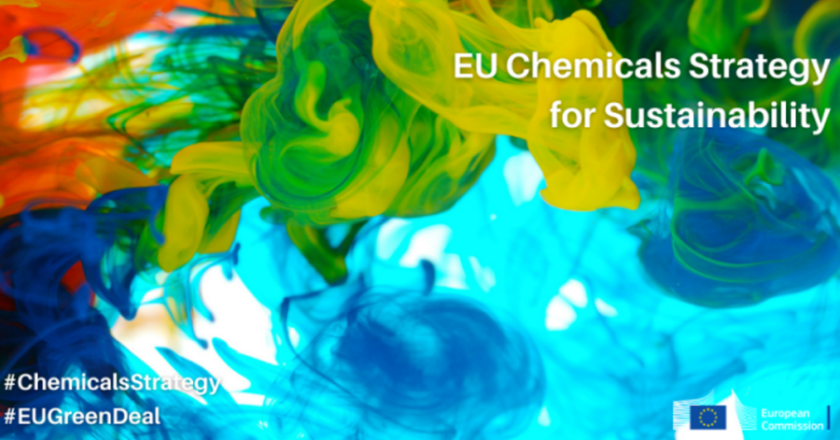
Commission adopts “Safe and Sustainable by design” guidelines
On 8 December, the European Commission adopted a safety and sustainability assessment recommendation created by the High Level Roundtable on the Implementation of the Sustainable Chemicals Strategy – of which EuChemS is an active member of.
The recommendation, titled “Establishing a European assessment framework for ‘safe and sustainable by design’ chemicals and materials” primarily focuses on health and environmental protection from hazardous materials. It lays down a framework to be used in Research and Development, which is expected to define a “safe and sustainable by design” criteria, that will guide consumer and food contact producers amongst others to ensure the safety of their products. Commissioner for Innovation, Research, Culture, Education and Youth, Mariya Gabriel and Commissioner for the Environment, Oceans and Fisheries Virginijus Sinkevičius both positively commented on the Commission’s adoption.
The document considers the aims of major EU strategies and frameworks such as the Green Deal and the Sustainable Finance Strategy to connect the Chemicals Strategy for Sustainability with them, while also linking it with already existing policy frameworks related to chemistry, such as the Registration, Evaluation, Authorisation and Restriction of Chemicals (REACH) programme.
The High Level Roundtable on the Implementation of the Sustainable Chemicals Strategy was set up by the Directorate General for Environment of the European Commission. EuChemS was invited to participate in the roundtable in 2021. President Floris Rutjes and Secretary General Nineta Hrastelj represented European chemists in the 3 roundtable meetings (and in the preparations for them) in the past years – and will continue to do so in the future.
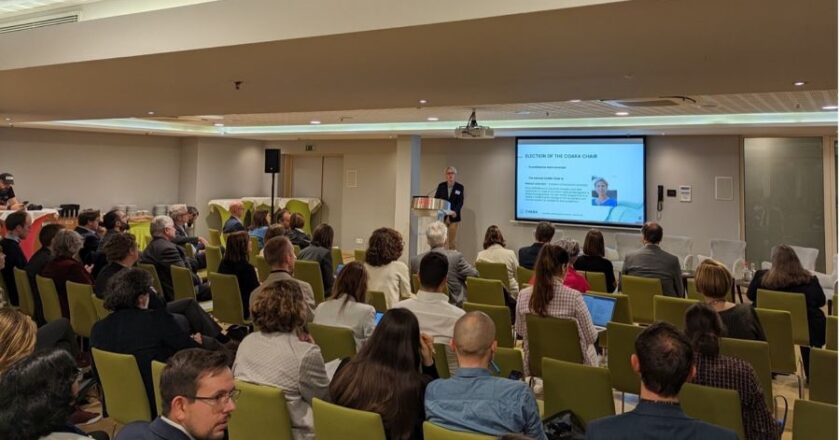
CoARA holds first Assembly
The Coalition for Advancing Research Assessment (CoARA) held its Constitutive Assembly online on 1 December, followed by an in-person roundtable in Brussels.
Organisations which signed the CoARA agreement before 17 November were invited. As EuChemS is an early signatory of the CoARA Agreement, Secretary General Nineta Hrastelj joined the Assembly as a voting representative, during the course of which the operational foundations for the coalition were laid down.
After the participating organisations accepted the key governing documents, Rianne Letschert, the President of Maastricht University was elected as the Chair.
On the evening of the day, those present in Brussel could participate in a Roundtable on the outcomes of the Assembly meeting and on the foreseen course of actions. It was highlighted that as of now CoARA can boast of more than 400 signatories – however calls were also made to ensure the equality and inclusivity of voices as the initiative goes ahead.

